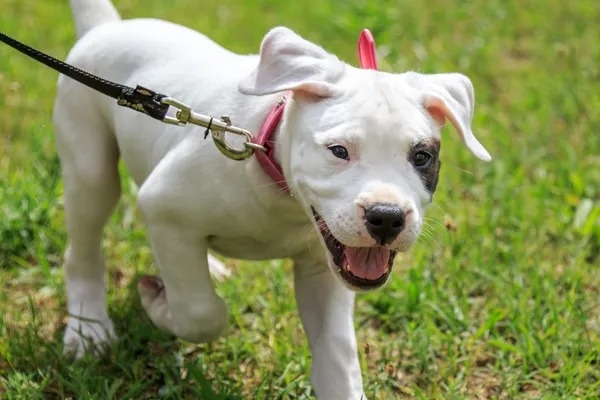Bringing home a new puppy
Puppy basics
By Zori Silver - December 18, 2024
Bringing a new puppy into your home is an exciting and rewarding experience, but it also comes with responsibilities. Proper housetraining, crate training, and socialization are key to ensuring your puppy grows into a well-behaved, confident dog. Here are some essential tips to help you navigate these early stages.
1. Housetraining Your Puppy
Housetraining is one of the first things you'll need to focus on when bringing your new puppy home. Consistency and patience are the keys to success.
-
Establish a Routine: Take your puppy outside to the designated potty area at regular intervals—typically every two hours, immediately after eating, drinking, or waking up. Puppies have small bladders and need frequent breaks.
-
Choose a Potty Spot: Always take your puppy to the same spot outdoors. The familiar scent will help them associate that spot with going potty.
-
Reward and Praise: As soon as your puppy eliminates outside, praise them with excitement and give them a treat. Positive reinforcement helps them understand that going potty outside is good behavior.
-
Accidents Happen: If your puppy has an accident indoors, don’t punish them. Simply clean the area thoroughly to remove any scent that might encourage them to go there again. If you catch them in the act, quickly take them outside to the potty area.
-
Use a Crate for Housetraining: Crates can be very effective in housetraining because dogs naturally avoid soiling their living area. Be sure the crate is appropriately sized—large enough for your puppy to stand, turn around, and lie down, but not so large that they have room to potty in one corner.
2. Crate Training
Crate training helps your puppy feel secure and provides a safe space for them when you're not around. It’s also crucial for housetraining.
-
Make the Crate a Positive Place: Never use the crate as a form of punishment. Instead, make it a comfortable and inviting space with soft bedding, toys, and treats.
-
Start Slow: Begin by introducing your puppy to the crate gradually. Leave the door open initially and let them explore it on their own. You can lure them inside with treats or meals.
-
Short Crate Sessions: Initially, leave your puppy in the crate for short periods, gradually increasing the duration. Always make sure they have been exercised and have had an opportunity to potty before crating them.
-
Never Leave a Puppy in a Crate for Too Long: Puppies can’t hold their bladders for long periods. A general guideline is no more than one hour for every month of age. For example, a 2-month-old puppy should not be crated for more than two hours at a time.
3. Socialization
Socialization is critical to ensure your puppy grows up to be a well-adjusted, friendly dog. Early socialization helps them feel comfortable around different people, dogs, and environments.
-
Expose to New Experiences: Start exposing your puppy to various sights, sounds, and experiences while they are young. This can include meeting new people, encountering other dogs, and visiting different places like the park or a pet store.
-
Positive Reinforcement: Always use treats and praise when your puppy behaves well in new situations. This builds positive associations with new experiences.
-
Puppy Classes: Consider enrolling your puppy in a puppy socialization class, where they can interact with other puppies and learn basic obedience. It’s also a great opportunity for you to learn how to guide your puppy through different situations.
-
Meet Other Dogs: If you have other dogs, allow your puppy to meet them in a controlled environment. When introducing a new puppy to adult dogs, ensure the older dogs are well-socialized and gentle.
-
Encourage Calm Behavior: When meeting new people or dogs, help your puppy stay calm by keeping the interactions short and positive. Avoid overwhelming them with too much stimulation at once.
4. Basic Training Tips
In addition to housetraining, crate training, and socialization, it’s important to start basic obedience training early. This helps your puppy learn how to interact with the world around them and provides structure.
-
Use Positive Reinforcement: Reward good behavior with praise and treats. Puppies respond best to encouragement rather than punishment.
-
Start with Basic Commands: Begin teaching basic commands such as "sit," "stay," and "come." These form the foundation for more advanced training as your puppy grows.
-
Keep Training Sessions Short: Puppies have short attention spans, so keep training sessions brief—about 5 to 10 minutes at a time—and frequent.
-
Consistency is Key: Use the same cues and rewards for specific behaviors to avoid confusing your puppy. The more consistent you are, the faster your puppy will learn.
5. Exercise and Playtime
Providing your puppy with ample exercise and mental stimulation is crucial to their development.
-
Daily Walks: As your puppy grows, incorporate daily walks into your routine. This provides exercise and helps with socialization.
-
Playtime: Engaging in play activities such as fetch or tug-of-war can help burn off energy. It's also a great way to bond with your puppy.
-
Puzzles and Toys: Provide toys that challenge your puppy’s mind, like puzzle feeders or chew toys. This helps with mental stimulation and keeps them entertained.
6. Health and Veterinary Care
Don’t forget to schedule regular vet check-ups to ensure your puppy’s health is on track. Prevention and proper nutrition is important for your puppy's well being. Feed your puppy a high-quality, age-appropriate diet to support their growth and development.
By providing your new puppy with a stable routine, consistent training, and plenty of love, you will help set them up for success. Remember, patience and positive reinforcement are essential for a happy, well-behaved dog. Enjoy this special time with your new furry companion!
Call Best Buddies Dog Training if you need some extra help and personalized training for your puppy!
